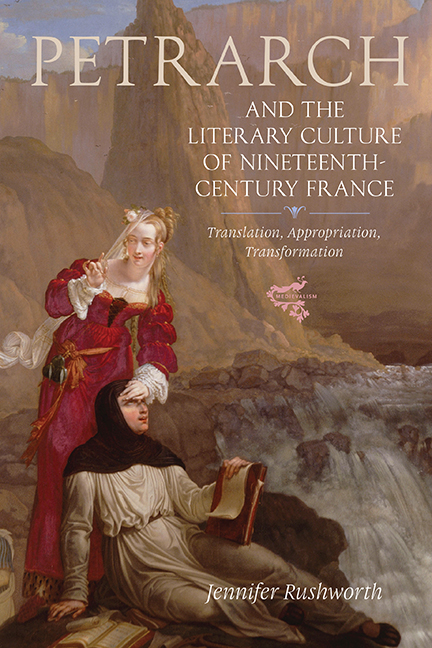 Petrarch and the Literary Culture of Nineteenth-Century France
Petrarch and the Literary Culture of Nineteenth-Century France Book contents
- Frontmatter
- Dedication
- Contents
- Acknowledgements
- Note on English Translations
- Introduction: Local History, Local Stories
- I Translations
- 1 Complete Translations of Petrarch's Canzoniere
- 2 Partial Translations of Petrarch's Canzoniere
- 3 Finding Laura in the Triumphi and Petrarch's Latin Works
- 4 Petrarch and Avignon: The Fate of the Sine nomine and RVF 136–8
- II Rewritings
- Conclusion: Petrarch and Patriotism
- Appendix 1 A Chronological Survey of Translations of Petrarch's Italian Poetry (the Canzoniere and Triumphi) between 1764 and 1903 in France
- Appendix 2 Translations of the Opening Stanza of RVF 126 from Voltaire (1756) to Brisset (1903)
- Bibliography
- Index
- Miscellaneous Endmatter
3 - Finding Laura in the Triumphi and Petrarch's Latin Works
from I - Translations
Published online by Cambridge University Press: 09 May 2017
- Frontmatter
- Dedication
- Contents
- Acknowledgements
- Note on English Translations
- Introduction: Local History, Local Stories
- I Translations
- 1 Complete Translations of Petrarch's Canzoniere
- 2 Partial Translations of Petrarch's Canzoniere
- 3 Finding Laura in the Triumphi and Petrarch's Latin Works
- 4 Petrarch and Avignon: The Fate of the Sine nomine and RVF 136–8
- II Rewritings
- Conclusion: Petrarch and Patriotism
- Appendix 1 A Chronological Survey of Translations of Petrarch's Italian Poetry (the Canzoniere and Triumphi) between 1764 and 1903 in France
- Appendix 2 Translations of the Opening Stanza of RVF 126 from Voltaire (1756) to Brisset (1903)
- Bibliography
- Index
- Miscellaneous Endmatter
Summary
BESIDES THE CANZONIERE, Petrarch's other significant poetic work in the vernacular was his six-part Triumphi, written in formal imitation of Dante's Commedia, that is, borrowing the earlier poet's interlocking tripartite rhyme scheme known as terza rima. Each Triumph depicts the victory of a particular abstract concept, although the trappings of chariots and processions fade away as the work proceeds. The Triumphi are in ascending order of potency, with Latin titles as follows: the Triumphus Cupidinis, Triumphus Pudicitie, Triumphus Mortis, Triumphus Fame, Triumphus Temporis, and the Triumphus Eternitatis. Essentially, the poem thus follows a sequence of encounters with and meditations on each concept, namely Love, Chastity, Death, Fame, Time, and Eternity, with each in turn defeating and overturning the former. Moreover, the final triumph is in direct conflict with the close of the Canzoniere. The Canzoniere concludes in RVF 366 with a repudiation of Laura as Medusa (a petrifying, spiritually deadening figure) and an invocation of the Virgin Mary, suggesting the possibility of some sort of conversion on the part of the poet–protagonist at the end of the work from Eros to Caritas. In contrast, the Triumphus Eternitatis reinstates Laura, ending with the whole of Paradise desiring to see Laura's resurrected body. The relationship between the Canzoniere and the Triumphi can be further refined through attention to late-eighteenth- and nineteenth-century French translators of the Triumphi. Again, decisions as to what to include where and under what title reveal more deep-rooted attitudes towards the Triumphi deducible from such material.
As with the Triumphi, no Latin work by Petrarch comes close to rivalling the number of translations of and from the Canzoniere into French produced in the nineteenth century. Moreover, the choice of texts from the Latin works often reflects similar motivations to the selections made by translators faced with Petrarch's vernacular poetry. That is, the choice of Latin works, like the decisions made in producing incomplete translations of the Canzoniere and/or the Triumphi, typically reveals an overriding interest in understanding and presenting Petrarch above all as an autobiographical love poet.
Complete Translations of theTriumphi
Perhaps surprisingly, there are marginally more complete translations of the Triumphi in this period than there are of the Canzoniere: seven of the first, and only five of the latter (six, if Godefroy's intentions rather than actions are taken into consideration).
- Type
- Chapter
- Information
- Petrarch and the Literary Culture of Nineteenth-Century FranceTranslation, Appropriation, Transformation, pp. 91 - 108Publisher: Boydell & BrewerPrint publication year: 2017


